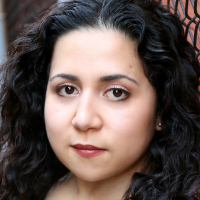Q&A with Sofiya Cheyenne and Evelyn Spahr
We sat down with Richard the Third cast members Sofiya Cheyenne (Mayor of London) and Evelyn Spahr (Earl of Richmond) to discuss their experience so far as women playing roles normally cast as men. Sofiya is a New York based actress and disability advocate, and can be seen in At Home with Amy Sedaris and has performed in New York in The Lilliput Troupe and The Briefly Dead. Evelyn has performed Off-Broadway in Light Shining in Buckinghamshire and in Henry V at Hartford Stage. Read the interview as they discuss issues of power, gender and complicity within the play.
STC: Can you tell us a little more about the characters you will be playing? Both of your roles are traditionally played by men.
 Sofiya Cheyenne: Both of us are at the end of the show so we haven’t really had time in rehearsal to dig deep with David and the other actors into our roles. I don’t have a clear answer yet about the Lord Mayor but within the context of the story it’s very exciting to have this role already associated with politics, to have a woman be the Lord Mayor is already a stamp of female power. But the Mayor is part of the dark side of the story, which is that Richard becomes king, and it ends up being the final stamp of approval with the citizens but whether it is by fear or by choice we haven’t really discovered that yet. It’s an interesting balance also to have a female in power that is on Richard’s side … maybe. I think that’s a fun idea to play with. Those have been my first thoughts as far as gender is concerned, but there’s so much freedom to do that and to cast women in these roles, too.
Sofiya Cheyenne: Both of us are at the end of the show so we haven’t really had time in rehearsal to dig deep with David and the other actors into our roles. I don’t have a clear answer yet about the Lord Mayor but within the context of the story it’s very exciting to have this role already associated with politics, to have a woman be the Lord Mayor is already a stamp of female power. But the Mayor is part of the dark side of the story, which is that Richard becomes king, and it ends up being the final stamp of approval with the citizens but whether it is by fear or by choice we haven’t really discovered that yet. It’s an interesting balance also to have a female in power that is on Richard’s side … maybe. I think that’s a fun idea to play with. Those have been my first thoughts as far as gender is concerned, but there’s so much freedom to do that and to cast women in these roles, too.
STC: What does it mean for you as a woman to play this king, Henry VII, and the beginning of the Tudor dynasty bloodline?

Evelyn Spahr: It’s funny because I just finished a show, Henry V, where I played Princess Catherine who is Richmond’s grandmother. The thing I love aside from the historical context is how archetypally good-natured Richmond is in the play and that a lot of that energy that he has in the play, although he is in masculine form, his energy is very feminine. It’s peace, equality, egalitarianism. I have a lot of beautiful lines about being good and being that stark contrast to Richard III. Feminine energy without masculine energy is just to be good. But in his monologue to his troops he’s very masculine in his need to oust the evil, masculine in being very forward thinking and achieving goals, but the way that Richard achieves his goals is by harming others that is devoid of feminine energy. For Richmond, those two energies live together, and perhaps they conflict at times, but they play beautifully. “My friends, if you do sweat to put a tyrant down,” that’s not feminine in its essence, but there’s a beautiful healthy balance of masculine and feminine going on in Richmond.
STC: What are you most excited about at this early point in the rehearsal process?
ES: The other day we ended the play and [our director] David Muse was like, “Where is our Richmond or someone like that in the whole of America?” One of the other actors said, “It’s an ideology. We expected a Richmond to come, but they haven’t arrived yet. We can wait our whole lives for a stark good person to come in and save everything.” But the counter argument to that would be that it’s a thought that we all have, we can all actively put a foot forward. Although I’m more than sure that everyone is participating in making good and bad character decisions there is very much the question: “Who am I going to be in this game? Am I going to be a Richard? Or am I going to be a person of goodness?”
SC: In this production the Lord Mayor is the first woman in power that we meet who is not a queen, and she doesn’t do what we think she might. She decides to be compliant, but there if it is far or her choice, we are still figuring that out. The question is as Evelyn asked: “Who is our Richmond?” The play is putting a mirror to us about our compliance and about the choices we make every day that let this cycle happen again and again. That mirror is hard to see because it reflects you and your choice and who you are. We hope this causes turmoil in the audience that maybe they feel it is about to you in the little ways, the ways that matter. As an ensemble we are playing with the mechanics of how every death happens and how we become involved in it. That is part of that mirror, too. That shows the audience that we all take a part in it.
ES: All Shakespeare plays have been enduring because they are essential stories that remain relevant today because they ask difficult questions: How complicit am I? How far will I go to achieve what I want? Where is that line where I am abusing my power?
Richard the Third runs from February 5—March 10. Tickets are available now at ShakespeareTheatre.org.

